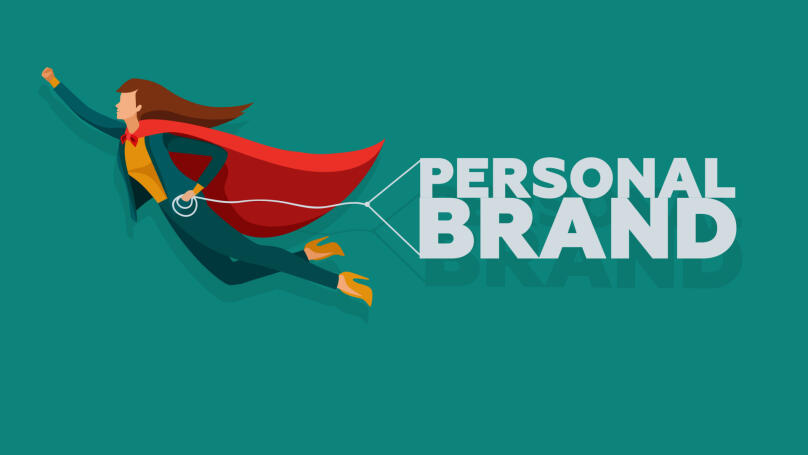Personal brand

What is a personal brand?
A personal brand is a public, recognizable and talked-about image of a person based on certain values and principles. In other words, a personal brand is a unique combination of your skills, experience, and worldview. It reflects your personality, allows you to communicate your values and control the impression you make on others and the way they perceive you. At the same time, a personal brand doesn't emerge in a random or spontaneous way. It is the result of targeted actions, which means that the process takes time, effort, and perseverance.
One might think that a personal brand consists of a logo, a slogan and corporate colors. However, this is not quite true, because even a business brand with its pronounced visual signs is, first of all, a set of unique features that distinguish one company from another. The same is true of a personal brand - its core component is your worldview manifested in your behavior, style of dress and posts on social media. Apart from your values and outlook, a personal brand also includes professionalism. It is a no less important component, as it allows you to make yourself known as a professional and expert in a certain field, as well as to speak about your achievements and recognition.
That's why a personal brand is also called a personal promotion tool, because a positive public image enables you to stand out among your competitors, increase your credibility in the professional community and demonstrate your expertise. So, it is essential to manage your personal brand. Many people mistakenly believe that their educational and professional background alone will enable them to succeed, but a well-thought-out personal brand can greatly accelerate the process.
Personal brand vs. reputation
A personal brand and a reputation have many things in common; however, they should not be confused. Both your personal brand and reputation have to do with the impression you make on people and the way they perceive you. They both affect your career development and open up new opportunities and prospects.
However, your reputation is just a certain well-established opinion about you. It is based, first of all, on the trust you enjoy among people around you, that is, whether they are willing to collaborate with you and trust you. Meanwhile, your personal brand is related to the personal values you communicate as well as your recognition and popularity in the team.
Moreover, everyone has a reputation. It's the way you communicate, the relationships you forge with friends and colleagues and how they perceive you as a result. Meanwhile, you need to build your personal brand in a targeted way, because it's how you want people to perceive you. In other words, your reputation is based on the opinions of the people around you, and your personal brand is based on your personal principles, actions, and desire to appear in a certain positive light.
Your reputation and personal brand are closely related, of course. In most cases, a reputation is a significant part of a personal brand. Thus, the personal brand concept is much broader and more encompassing, because it can be interpreted as a special promotion strategy or an approach to managing one's social or media image.
Why is a personal brand important?

In today's world, with people's attention spans shrinking, it is essential to quickly make a positive first impression. The best way to do this is to build your own personal brand that expresses all your values and views.
So, creating your personal brand enables you to get control of what people think of you. The entrepreneur and Amazon founder Jeff Bezos says that a personal brand "is what people say about you while you're not in the room." That is, a positive personal brand enables you to emphasize your strengths and helps people around you to get to know you better. In this way, they can get convinced of your professionalism and other strengths even if you don't know each other personally. That's why every professional should pay attention to building a personal brand. For example, an entrepreneur needs a strong personal brand to attract new loyal customers, investors, and employees willing to collaborate with them because they have similar mindset and views. At the same time, a rank-and-file specialist, a full-time company employee or a freelancer also require a personal brand to demonstrate their professionalism and advance their career.
Besides, a personal brand is especially useful for those who promote themselves and their business on such platforms as Instagram, Facebook, YouTube, TikTok, and LinkedIn. Only a well-managed personal brand can enable you to become a true opinion leader and attract a mass audience. Special courses to promote your personal brand on social media are available for the purpose, for example, on Lectera educational platform.
Personal brand benefits
There are several key benefits that will convince you that you need to create and maintain a personal brand:
1. Allows you to stand out from the crowd and increase your competitiveness
In today's job market, it is more important than ever to have a strong and successful personal brand. Above all, it will enable you to stand out among a huge number of competitors, to stick in employers' minds and to open up new career prospects for yourself!
2. Contributes to income increase
Later, your personal brand can even help to increase your salary or income in general. For example, thanks to your visibility, you can increase your social media outreach and therefore your advertising rates. That is, recognition enables you to attract new clients and increase your services' value.
3. Helps you build trust with your audience
Your personal brand helps enhance your clients' loyalty and trust, leading to long-term and constructive collaboration.
4. Enables you to increase your influence in the professional field
In other words, it is your personal brand that will help you become a true opinion leader and promote yourself not only in your professional and specialized field, but also in the media environment. You can be invited as an expert or become a partner in various projects, which will expand your area of activity and allow you to progress in different fields.
5. Facilitates networking and allows you to make new acquaintances
As a rule, a person with a strong personal brand has a lot of professional connections and acquaintances. Such a large network of contacts offers numerous advantages, for example, many more interesting meetings and events, as well as increased motivation to work and achieve new goals.
How to build a personal brand

As we already know, a personal brand development is a full-fledged promotional strategy, and you need to take it seriously in order to get all of the above benefits. This involves several main stages which follow strictly one after another:
Step 1. Defining your goal
Firstly, you need to set a goal, that is, clearly answer the questions "Why do you need a personal brand?" and "What do you want to achieve with it?" Understanding why you need a personal brand in the first place and why this idea appeals to you in particular will make the work ahead simpler and allow you to cope with tasks more easily and quickly. For example, you dream of finding a dream job, getting a new position, and attracting investors, but something prevents you from achieving all this. So, it's time to boost your personal brand!
Besides, at this stage, you should carefully assess all the risks and challenges you will have to face. After all, you need to make regular efforts to develop a personal brand, for example, to put out posts and photos several times a day, to write notes or articles, to live stream, make videos, and so on. So it's a good idea to decide in advance whether you're ready for such routine chores.
Step 2. Self-exploration or self-discovery
As you already know, your personal brand is based on your worldview. At this stage, you need to find out what drives you, what your views on certain things are, what values you hold, and so on. You should ask one key question at this stage: "Who am I?" or "What am I like?" However, to make it easier to answer it, you can break it down into several smaller ones:
- What motivates me to go to work?
- What skills and talents am I most proud of?
- What do I still need to learn?
- What are my accomplishments, and what do I still want to achieve?
- What are my competitive advantages?
- What tasks or projects do I do best? Which ones energize me the most?
- What topics are of interest to me? What are my hobbies, what fascinates me?
- How can I help the world, what contribution can I make to its progress? And so on.
It is best to give detailed answers in writing. You can also use the "elevator speech" technique. Imagine that you are in an elevator with a potential employer who everyone dreams to work for. You now have one minute at the most, while you are in the elevator cab, to convince them to hire you. In this time, you should mention all your strengths, skills and abilities, achievements and future goals. The elevator speech method can be a great training exercise in networking and quickly gaining people's trust.
Moreover, to thoroughly cover this stage, you can ask your colleagues, friends, and family to describe yourself, your character, strengths, and weaknesses. Listen carefully to the people around you, because their answers will allow you to look at yourself from a different perspective and figure out what impression you make on others.
Step 3. Identifying your audience
By this stage, you've identified your own values, views, and principles. It's now time to figure out which audiences will relate to them as much as you do.
Finding and building your own audience is directly linked to the very first stage, i.e., defining the original purpose of creating a personal brand. For example, if you are an aspiring specialist and dream of getting a dream job, then your target audience should be headhunters, recruiters and HR managers. And if you are already an experienced entrepreneur and want to advance your business, then you should target an audience comprising potential clients or partners. This will allow you to figure out the way to conduct yourself and what content to publish in order to attract the right people.
Step 4. Researching the audience
You can make your personal brand successful and strong only if you, your subscribers and customers share the same worldview. After all, it is these people - your audience - that you will be addressing in your posts, notes and articles, live broadcasts and videos. You need to identify the topics your audience is interested in, who they subscribe to on social media, what posts they comment on most often, what they think is right and what is wrong. This will determine what content you should post, what topics to cover, and what headaches to share.
Step 5. Analyzing your competitors and identifying your advantages
In order to understand exactly what you can engage your audience with, you should analyze the market and evaluate your competitors. This will help you to figure out where your own uniqueness lies, what makes you stand out from the crowd of other professionals, what your strengths are and the way to enhance them.
It is also a good idea to specify - at this stage - the area which you are building your personal brand in. For example, if you are a graphic designer, you might consider taking on a narrow niche, such as a UI designer.
Step 6. Creating a strategy
You've covered the first five stages, which can be nominally called preparatory. So, you already know what you are creating a personal brand for, you have a clear idea of your own worldview and your audience's values. It's now time to create a strategy.
You need to think through the details of the image that you want to create in the minds of your audience. Remember that it must be unique, memorable, and understandable for your subscribers, customers and partners, that is, those you want to impress. Based on the information gathered earlier, think about the way to gain people's confidence and to convince them of your professionalism. Your overall image also includes your appearance and communication style, for example, more strict and formal or on the contrary, informal and even overly familiar. It all depends on who your audience are and on their preferences and expectations.
At this stage, you should also choose communication channels and platforms where you will promote your personal brand. In addition, think about the content format and design of your publications. Remember that you should make choices based on the needs of your audience.
Step 7. Implementing your strategy
At this stage you need to stick to your chosen brand-building strategy at all times, to communicate regularly with your audience, to be active on social media and live up to the image you've created. To promote your personal brand, you can set up your own blog or website, collaborate with influencers and start an email newsletter. The main thing is to stay tuned to the trends and monitor your competitors to improve your personal brand, to stay interesting for your audience and attract new people.
Personal brand examples

Every successful person - a musician, an entrepreneur, an artist, or a journalist - has a personal brand. We may not even think about it, but - day in and day out - everyone improves and maintains the image they have created. For example, the actress and model Kim Kardashian is one of the most remarkable examples of a strong personal brand. She aggressively maintains her image on social media, starring in reality shows. Recently, she has even appeared in the legendary American Horror Story.
The American comedienne and TV presenter Ellen DeGeneres also has a highly recognizable image. A universal favorite in America and beyond, she hosts her own evening show, not afraid to joke about herself and even the most important guests to her program. Ellen behaves in a most relaxed way, and her signature style of dressing features sneakers paired with business suits.
The already mentioned Jeff Bezos - the head of Amazon Corporation - is also a good example of a successful personal brand. Interestingly, Bezos always looks respectable, stylish and 'expensive', unlike his colleague Mark Zuckerberg, who prefers sneakers, jeans, and gray T-shirts. At the same time, both Bezos and Zuckerberg have recognizable and successful personal brands, which they maintain with every social media post or speech.
Another famous entrepreneur on our list is Elon Musk. He aggressively maintains his image on social media and in every public appearance. You would agree that even the names of his children - son X Æ A-12, daughter Y and newborn son Techno Mechanicus - say a lot about Elon's values and views on the world.
Conclusion
So, a personal brand offers many benefits, such as recognition and a trusted relationship with one's audience, for example. However, it is essential to be aware that it takes a lot of time, effort, and investment. In addition, branding is such a unique and personalized process that there are simply no one-size-fits-all rules. The main thing is to be sincere and open. Don't hesitate to talk about yourself and communicate to the world the values you believe in!























